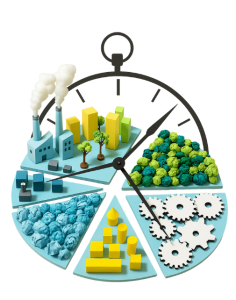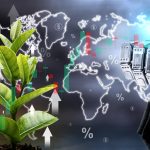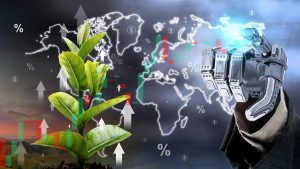The relevance of The Nobel Economics Prize for investors
 David Seligman
David Seligman
Fund Manager
_______________________________________________________________________________________________________
So, GTC thinks that the 2025 Nobel Economics Prize is relevant to our investors. Here’s why:
In today’s high-tech world focused on rapid growth and consumer spending, it comes as something of asurprise to realise that sustained improvement in living standards is a relatively recent phenomenon in humankind’s history.
Prior to the Industrial revolution some 250 years ago, there was relatively little economic growth for millennia. This is despite some notable philosophical and scientific advancements in ancient Greece and Rome and a revival of classical knowledge during the Renaissance. Leonardo da Vinci may have designed a helicopter, but it didn’t get off the ground for another few centuries! Similarly, despite China leading the world in technological advances until the 14th century (think paper and gunpowder), this did not translate into improved growth and living standards for its citizens.
The Industrial Revolution in late 18th century Britain was the catalyst for sustained economic growth, which has continued (despite setbacks during periods of war and economic depression) to this day. The 2025 Nobel Laureates (Joel Mokyr, Philippe Aghion and Peter Howitt) researched how innovation and technological improvement drives sustained economic growth. Economic growth, in all of its guises, directly affects investment markets and how we use them.
Mokyr’s work pinpointed some of the key prerequisites that led to sustained growth from the Industrial Revolution, particularly the joint evolution of science and technology, while Aghion and Howitt describe a process they call ‘creative destruction’. This involves new innovations making older products obsolete leading to new firms and improvements entering the market, while other firms with obsolete products and services may exit the market.
 Mokyr shows that economic growth and technological improvements require a continual flow of useful knowledge. This useful knowledge has two parts, both of which need to be present: propositional knowledge’ which shows why something works and prescriptive knowledge, such as practical instructions, drawings or recipes that describe what is necessary for something to work.
Mokyr shows that economic growth and technological improvements require a continual flow of useful knowledge. This useful knowledge has two parts, both of which need to be present: propositional knowledge’ which shows why something works and prescriptive knowledge, such as practical instructions, drawings or recipes that describe what is necessary for something to work.
He also stresses that society must be open to change. New inventions replace old technologies and can destroy existing structures and ways of working, which often leads to resistance from established interest groups who feel their privileges or working life are threatened, for example the Luddites who destroyed the machinery that was replacing their jobs at the beginning of the Industrial revolution. History repeats itself with taxi drivers around the world attacking Uber drivers.
Aghion and Howitt developed a mathematical model showing how companies invest in research and development (R&D) to innovate and compete. They note that growth is transformative but disruptive, creating winners and losers (e.g., job losses in outdated industries). As a result, it is in broader society’s interest to support displaced workers and encourage innovation through education, social mobility, and policies. Despite living in an age of rapid innovation and change we need to be mindful that sustained growth is not guaranteed. Vigilance is necessary against threats like market dominance, resistance to change, and inequality, which can function as setbacks to this sustained growth.
As the Nobel Committee themselves noted: ‘It is apparent that, in the long run, sustained growth does not only have positive consequences for human wellbeing. First, sustained growth is not synonymous with sustainable growth. Innovations can have significant negative side effects… This often requires well-designed policies, such as in the areas of climate change, pollution, antibiotic resistance, increasing inequality and the unsustainable use of natural resources.’
There are differences between sustainable and sustained growth
Sustainable growth focuses on long-term viability by balancing economic, environmental, and social factors, ensuring growth doesn’t deplete resources or harm the future. Sustained growth refers to the ability to maintain a consistent upward trajectory over time, without significant interruptions or weakness, but doesn’t necessarily account for environmental or social impact.
In essence, sustained is about the continuation of growth, while sustainable is about the manner and health of that growth.
The prevailing political preference in the USA seems to favour sustained growth over the sustainable. Within MAGA politics, ‘Drill, baby, drill’ represents both an economic populist rallying cry and a symbolic rejection of climate-focused policy frameworks seen as limiting U.S. power or prosperity. This action directly represents the current Administration’s focus on sustained growth over the sustainable.
While the last 50 years have undeniably seen billions of people lifted out of poverty and resulted in huge increases in wealth, inequality between rich and poor has never been greater in many countries, while climate change and resource depletion are becoming critical.
The Nobel Laureates suggest that it would make sense to invest in countries and companies that foster openness, support R&D, and address societal challenges to ensure continued progress. While Mokyr’s research implies that AI could indeed reinforce the relationship between propositional and prescriptive knowledge and therefore increase the rate at which useful knowledge is accumulated, there are safeguards we need to implement.
 Threats may come from potentially disadvantaged groups or a few companies being allowed to dominate the market or from state actors that restrict the flow of information and knowledge. If we fail to recognise these threats, the machine that has given us sustained growth, creative destruction, may cease working – and we would once again need to become accustomed to stagnation rather than growth.
Threats may come from potentially disadvantaged groups or a few companies being allowed to dominate the market or from state actors that restrict the flow of information and knowledge. If we fail to recognise these threats, the machine that has given us sustained growth, creative destruction, may cease working – and we would once again need to become accustomed to stagnation rather than growth.
While the 2025 Nobel Economics Prize winners suggested a more measured long-term evaluation of growth, it must be remembered that this research and the award recognising it, do not in themselves protect mankind from itself, from the outcomes of sustained rather than sustainable growth. Perhaps it is only peer pressure and where we direct our investments that can shape the responsible direction of our future?








